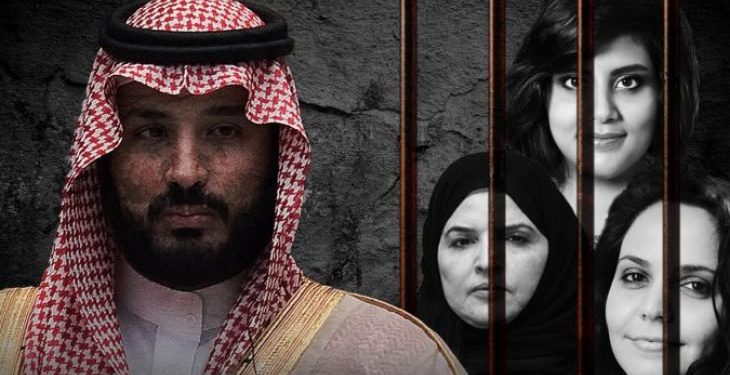
In interviews with the Western media, Crown Prince Mohammed bin Salman has always claimed that he is unaware of all human rights abuses, torture, espionage, or murder in the Kingdom in an attempt to shirk direct responsibility.
But hundreds of examples belie bin Salman’s allegations, especially after it has been repeatedly proven that his top aides, such as Saud al-Qahtani, directly supervise the torture of prisoners of conscience, including Lijain al-Hathlul, an activist who has been held in a prison for more than a year because of demanding women rights.
When asked by bin Salman in a television interview with an American program, is it time to release Lujain Hathloul? He claimed that the decision was not in his hands but in the hands of the Attorney General in the Kingdom and claimed that he was an independent prosecutor.
The family of Lujain al-Hathloul confirms that she was tortured inside the prison.
Alia Hathloul pointed to the reality of her sister Lujain and the physical and sexual torture suffered by the adviser of bin Salman – Saud Al-Qahtani.
Al-Qahtani, who oversaw the her torture, is one of the men behind the October 2 assassination of prominent journalist Jamal Khashoggi.
In addition to being subjected to torture, an attempt was made to delude Lujain that she was drowning in the presence of Saud al-Qahtani, who also witnessed torture sessions, threats of rape and electric shocks.
“They have to realize that justice will one day run, but it is essential that people talk about it and not remain silent,” said Alia.
Human Rights Watch has called on the Saudi authorities to allow international independent observers access to women activists detained since May to ensure their safety.
The organization said in a statement that it had received a report on 28 November last from a source “informed” that a human rights activist was tortured, and that based on various sources, the torture of activists may be ongoing.
The official policy of the Saudi regime is based on torture and neglect of prisoners of conscience and has a poor record of treatment of detainees opposed to the regime, including suspicions of torture and medical negligence.
Over the past two years, hundreds of activists and human rights activists have been arrested in Saudi Arabia for their public stances and demands for political and social reform and public freedoms, amid repeated human rights demands for their fate and justice.
Human rights organizations have repeatedly called for an independent international investigation into the poor detention conditions of dissidents in the Kingdom’s prisons, the Saudi authorities ignoring demands to provide them with health care and halting abuses and psychological and physical torture.
Human rights organizations argue that ill-treatment of opposition detainees in Saudi Arabia could amount to internationally prohibited torture, requiring that anyone responsible for torture and ill-treatment be held accountable or prevented from receiving medical care.